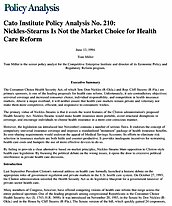The primary virtue of Nickles-Stearns is that it avoids the worst features of the Clinton administration’s proposed Health Security Act. Nickles-Stearns would make health insurance more portable, avoid structural disruptions in coverage, and encourage individuals to choose health insurance in a more cost-conscious manner.
However, the legislation (as introduced last November) contains a number of serious flaws. It endorses the concept of compulsory universal insurance coverage and imposes a standardized “minimum” package of health insurance benefits. Its cost-sharing requirements would undercut the appeal of Medical Savings Accounts. Its efforts to eliminate risk selection in insurance markets are both futile and counter-productive. It provides inadequate incentives for restraining health care costs and hampers the use of more effective devices to do so.
By failing to provide a clear alternative based on market principles, Nickles-Stearns blurs opposition to Clinton-style health care legislation. By focusing the political debate on the wrong issues, it opens the door to extensive political interference in private health care decisions.


